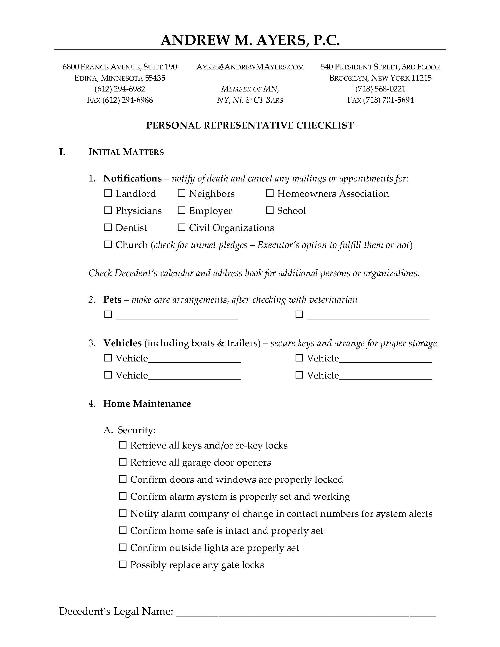 If you've been named as the executor (called a personal representative in some states) of an estate, you may not know where to start. If you've been appointed by someone's will or trust, you at least know they did some estate planning to spell out their wishes. There are likely documents left behind that will spell out what the person wanted to do with their assets and who should take care of their children if they are underage. It creates a path forward for you to manage and distribute their estate.
If you've been named as the executor (called a personal representative in some states) of an estate, you may not know where to start. If you've been appointed by someone's will or trust, you at least know they did some estate planning to spell out their wishes. There are likely documents left behind that will spell out what the person wanted to do with their assets and who should take care of their children if they are underage. It creates a path forward for you to manage and distribute their estate.
If you've been appointed as the executor by a court, then your job may be a bit more challenging. This happens when a person dies without a will (called intestate) and the executor's role is to carry out the distributions according to the law. You've got a set of court rules to follow and oftentimes, you'll be forced to ask for the court's permission before you are able to conduct certain transactions. If the heirs are hard to find, you may find yourself with much more work than you anticipated. And if they are easy to find, but unhappy with how the law says to distribute the property, you may also end up with a lot more work.
Regardless of how you found yourself in this role, there are resources and professionals out there who can help you through the process.
Five Questions to Ask
The Wall Street Journal has a good article from Michael Pollock, Five Questions to Ask if You Are Named Executor of an Estate. The questions he says you should ask,
- Who is on the team?
- Was a trust created?
- Are funds available to cover near-term costs?
- Are the estate's assets suitable for heirs?
- Are heirs on board with the timetable?
The team concept is one that I'm a big proponent of and it even works as an acronym (Trusted Experts, Authorities, and Mentors). Whether you are running your own business or putting together an estate plan, it's important to have a team working with you to maximize your planning and protection of your legacy. If you're an executor, hopefully, the person had a strong team around them, which will make your job a lot easier.
If a trust was created, your job as an executor can be very straightforward and may not require filings with the court. With a properly created and funded trust, the deceased may not even have any assets left in their name at the time of their death. Many times, the will that goes with the trust simply says to transfer any assets into the trust (called a "Pourover Will") and that's all you need to do.
When examining the funds that are available and whether the assets are suitable for heirs, it's a good time to have a discussion with the deceased person's financial advisor and accountant. The accountant should have a good idea of what types of liquid assets are available for short-term expenses of the estate and the financial advisor should have a handle on the long-term investments and whether they are suitable to be immediately distributed to the heirs.
The final question is one that comes down to keeping the expectations of the heirs in place. Unlike movies, which seem to wrap these things up in a nice little bow within a few minutes, managing an estate and finishing all your tasks can take some time. It's a faster process through proper estate planning, but if a person dies without a will or a court is needed to assist with the administration, then things can take much longer. These days, courts are still attempting to dig out from prior backlogs and many cases are taking longer than they would have in the past.
You May Also Like
- Is It Easy to Update My Will?
- Specific Distributions and their Role in Your Estate Plan
- How Do My Assets Get Transferred When I Die?
Next Steps
If you've been appointed as an executor or personal representative and aren't sure what the next steps are to take, let's set up a Legal Strategy Session to discuss the next steps for you.


